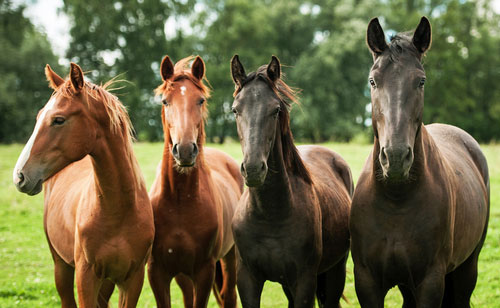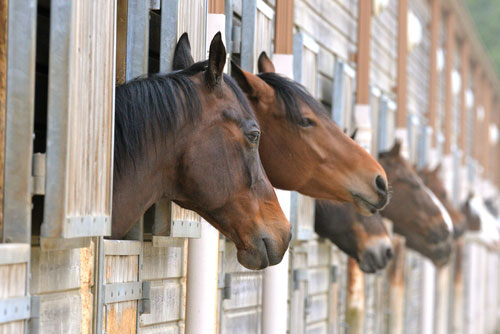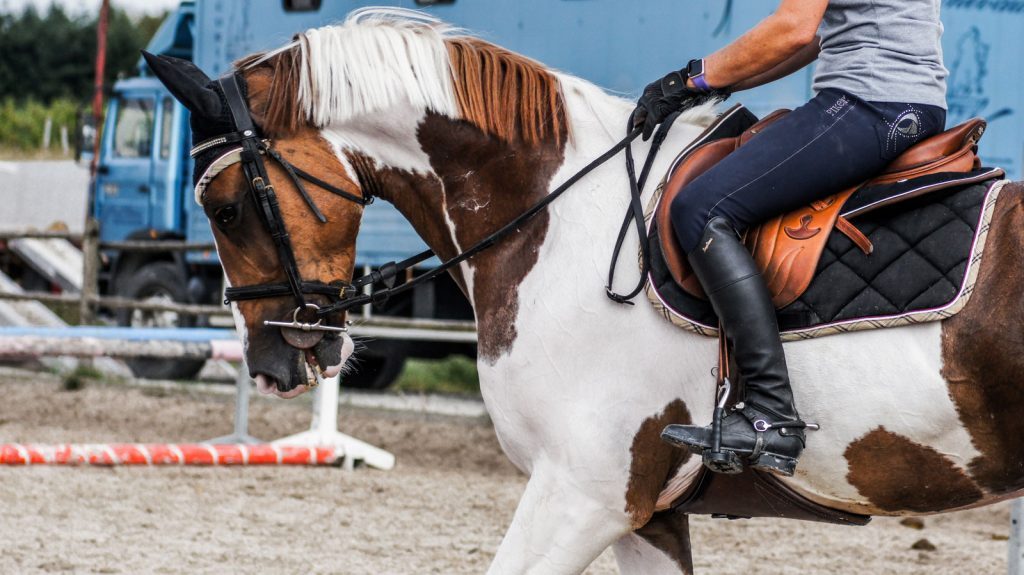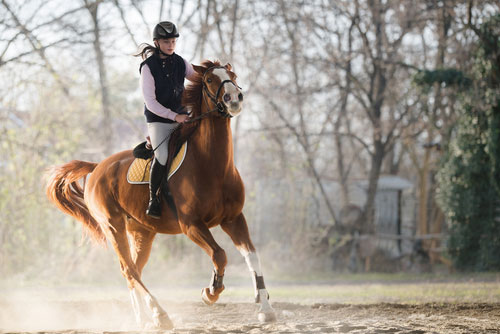No products in the cart.
Behavioral Issues In Pets, Natural Pet Health
Is your horse stressed out?
Signs, causes and how to manage stress in horses.
Stress is a normal physiological process that occurs in all animals, and just like it affects us humans, stress can also affect your horse.
Short-term stress is actually an adaptive mechanism and is not always bad because it helps horses escape a threat or cope better with their environment. Basically, if horses didn’t get stressed sometimes, they would be more likely to get into tricky situations. However, the problem comes when horses are stressed for longer periods of time, without being able to get away from what is causing it. This is when stress begins to have damaging effects on your horse’s body, including reduced immunity, inhibited performance and, in particular, gastric ulcers (EGUS).
So, how can you tell if your horse is stressed, what are the most common causes and what can do you do to help ensure your horse’s stress levels are kept to a minimum for optimum health and performance?
Signs of stress in horses
When your horse is exposed to something than elicits a stress response, commonly known as a ‘stressor’, their body releases a hormone called cortisol which promotes behavioural and physiological changes that result in some common signs and symptoms of stress, including:
- Vocalisation or ‘whinnying’
- Tail Swishing
- Defaecating
- Reduction of appetite
- Restlessness
- Stereotypies e.g. crib biting or box walking
- Flared nostrils
- Flightiness
- Sweating
- Elevated cortisol levels
- Elevated heart rate
- Gastric ulcers
Causes of Stress in horses
If your horse shows any or a combination of these signs, then it is likely they are experiencing stress. Once you know your horse is potentially stressed, the best plan of action is to find out what is causing it and taking appropriate action to reduce stress levels.
There are many causes of stress linked to environment, routine and management but some of the most common ones include:
Pre-Performance/Competition
Just as we can get stressed and fearful of performance, so can our horses. In addition, the noise, atmosphere and other horses at a competition or show are major stressors which can affect your horse. Research has shown that cortisol levels rise at competitions prior to performance in a range of disciplines and that higher or prolonged levels of stress negatively affect performance (Becker-Birk et al. 2013; Lewinski et al. 2013; Christensen et al. 2012).
Change of environment
Horses in an established herd have access to familiar resources, safety, social relationships and the opportunity to be a horse, which is essential for their health and well-being. Changing your horse’s environment by moving to a new home challenges all of these factors simultaneously. Horses thrive when in familiar surroundings with familiar horses, so taking them out of this and putting them into an unfamiliar environment can be one of the most stressful things a horse can experience.
Introduction of new horses
Introducing new horses into an established herd can be challenging, not only for the new horses, but also for other herd members. Within this herd, a distinct hierarchy will exist that allows all members to know their place, often forming bonds with similar ranked horses and enabling everyone to live well together as a group. When a new horse arrives, this hierarchy is disrupted, and each horse needs to re-establish their place within the herd. This upheaval and uncertainty can be stressful for all horses, but particularly those of a lower ranking that will need to defend their position over the new horse.

What can you do to help reduce stress in your horse?
The good news is that stress can be reduced with the right management and support. Understanding your horse’s mental and physiological needs and giving them as natural a life as possible that reflects these, will help manage any potential stress.
Experience counts
In horses who suffer with performance stress, good management can help keep them calm and focused. Research has shown that more experienced horses are much less stressed at competitions, so try and ensure your horse is as ‘experienced’ and well prepared as can be for future competitions. Getting your horse out and about from a younger age is therefore essential to help them become familiar with all the sights and sounds of a competition and acclimatised to what is expected of them.
Creating similar noise, stimuli and the general excitement that you find at shows by taking your horse to clinics and group lessons is a vital step in the competition horse’s education. And getting your horse familiar with signs and the many strange objects that they might see at a show, so it becomes part of their routine, can also help to reduce stress. Routine is very reassuring to horses, so it’s important to try to stick to the same routine at the show as you would at home – use the same tack and feed and create a pre-performance warm up routine that is the same at every competition, to help keep your horse calm and prepared before entering the ring.
Moving to a new yard
If you have recently moved your horse to a new yard, try to consider your horse’s feelings and keep everything as normal as you can. Try to visit the new yard with your horse and walk around before you move, so they can take in the new surroundings and horses. When your horse arrives, help reduce stress by sticking to the same feed and routine as before – it is much easier for horses to adjust if they understand what they are supposed to be doing and when. Monitor your horse’s behaviour to assess how well they are settling in and provide some forage enrichment in the stable to help with calmness. Give your horse a few days to adjust to the new surroundings before riding and spend plenty of time grooming and doing the same things as on your previous yard. This will help keep your horse calm and your company will reassure him if he is feeling insecure.

Introducing a new horse to the herd
When introducing new horses into a herd, steps can be taken to help make this transition as painless as possible. Taking some time to study the hierarchy of the new herd before you introduce your horse will help assess which horses may be more dominant and get a feel for rankings within the herd. Turning the new horse out on his own into an adjoining field with a sturdy fence first is ideal for making initial introductions. After a few days, you can then put a middle-ranked horse in with the new horse, so the two can bond. If you are able to, remove the herd from the main field and introduce the new horse and his buddy into this field, so the new horse can get a feel for the land and decrease the chance of them running into danger. Finally re-introduce the rest of the herd. There will be some activity and galloping about whilst the herd gets re-established and the new member accepted, but following these steps should help make it as stress-free as possible.
Natural remedies to help keep your horse calm
HomeoPet’s EquioPathics Pre-Performance Stress medicine is a great option if your horse needs a little extra support during stressful situations. This safe, gentle and all-natural medicine is drug free and so does not contravene any competition rules for prohibited substances. Available in an easy liquid dose, EquioPathics Pre-Performance Stress promotes relief from fear of performing, change of stables or environment, the introduction of new animals and other stressful situations causing signs of anxiety or fear to be exhibited.
Whilst you cannot completely eliminate stress from your horse’s life, taking steps to reduce the impact of potential stressors and help promote calmness can help mitigate the challenges of different situations, and keep those stress levels to a healthy minimum.
Lisa Elliott, MSc Equine Science, Bsc Biology






